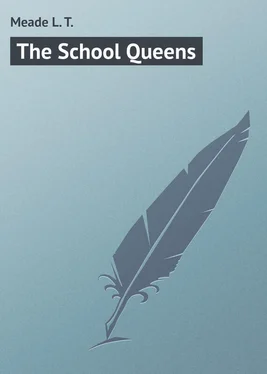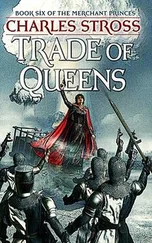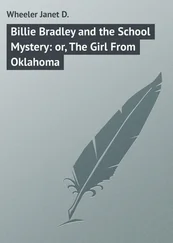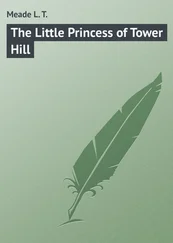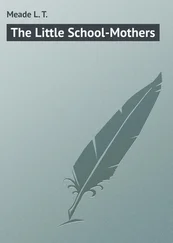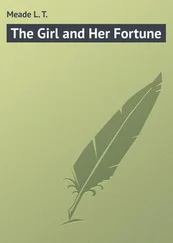L. Meade - The School Queens
Здесь есть возможность читать онлайн «L. Meade - The School Queens» — ознакомительный отрывок электронной книги совершенно бесплатно, а после прочтения отрывка купить полную версию. В некоторых случаях можно слушать аудио, скачать через торрент в формате fb2 и присутствует краткое содержание. Жанр: foreign_children, foreign_prose, foreign_language, на английском языке. Описание произведения, (предисловие) а так же отзывы посетителей доступны на портале библиотеки ЛибКат.
- Название:The School Queens
- Автор:
- Жанр:
- Год:неизвестен
- ISBN:нет данных
- Рейтинг книги:3 / 5. Голосов: 1
-
Избранное:Добавить в избранное
- Отзывы:
-
Ваша оценка:
- 60
- 1
- 2
- 3
- 4
- 5
The School Queens: краткое содержание, описание и аннотация
Предлагаем к чтению аннотацию, описание, краткое содержание или предисловие (зависит от того, что написал сам автор книги «The School Queens»). Если вы не нашли необходимую информацию о книге — напишите в комментариях, мы постараемся отыскать её.
The School Queens — читать онлайн ознакомительный отрывок
Ниже представлен текст книги, разбитый по страницам. Система сохранения места последней прочитанной страницы, позволяет с удобством читать онлайн бесплатно книгу «The School Queens», без необходимости каждый раз заново искать на чём Вы остановились. Поставьте закладку, и сможете в любой момент перейти на страницу, на которой закончили чтение.
Интервал:
Закладка:
“Thinks of them!” replied Isabel. “It’s my opinion she won’t tolerate them for a minute; and we are bound to take her with us, for of course they will give permission.”
“Well,” said Molly, “I’ll be off at once and secure that permission. You’ look after Maggie – won’t you, Isabel? – and see that her bedroom is all right.” As Molly spoke she waved her hand to her sister, then departed on her errand.
She was a bright, fairly good-looking girl, with exceedingly handsome eyes and curling dark-brown hair. She was somewhat square in build and athletic in all her movements. In short, she was as great a contrast to the twin Cardew girls as could be found. Nevertheless she liked them, and was interested in them; for were not the Cardews the great people of the place? There was nothing of the snob about Molly; but it is difficult even for the most independent English girl to spend the greater part of her life in a village where one family reigns as sovereign without being more or less under its influence.
Mr. Tristram, too, was a very great friend of Mr. Cardew’s; and Molly’s fat, round, good-natured mother, although a little afraid of Mrs. Cardew, who was a very stately lady in her way, nevertheless held her in the greatest respect and admiration. It was one of the rules of the house of Tristram that no invitation sent to them from Meredith Manor should be refused. They must accept that invitation as though it were the command of a king.
The girls, brought up mostly at foreign schools, had in some ways wider ideas of life than had their parents. But even they were more or less influenced by the fact that the Cardews were the great people of the place.
The day was a very hot one; rather oppressive too, with thunder-clouds in the distance. But Molly was very strong, and did not feel the heat in the least. The distance from the rectory to the Manor was a little over a mile. In addition, it was all uphill. But when you passed the village – so exquisitely neat, such a model in its way – you found yourself entering a road shaded by overhanging elm-trees. Here it was cool even on the hottest summer day. There were deep pine-woods at each side of the road, and the road itself had been cut right through a part of the forest, which belonged to the Meredith estate. After going uphill for nearly three-quarters of a mile you arrived at the handsome wrought-iron gates which led to the avenue that brought you to the great front door of Meredith Manor.
Molly often took this walk, but she generally did so in the company of her sister Isabel. Isabel’s light chatter, her gay, infectious laughter, her merry manner, soothed the tedium of the road. To-day Molly was alone; but by no means on this account did she feel a sense of weariness; her mind was very busy. She was greatly excited at the thought of seeing Maggie Howland again. Maggie had made a remarkable impression on her. She made that impression on all her friends. Wherever she went she was a leader, and no one could quite discover where her special charm or magnetism lay; for she was decidedly plain, and not specially remarkable for cleverness – that is, she was not remarkable for what may be termed school-cleverness. She was indifferent to prizes, and was just as happy at the bottom of her form as at the top; but wherever she appeared girls clustered round her, and consulted her, and hung on her words; and to be Maggie Howland’s friend was considered the greatest honor possible among the girls themselves at any school where she spent her time.
Maggie was the daughter of a widow who lived in London. Her father had died when she was a very little girl. He was a man of remarkable character. He had great strength of will and immense determination; and Maggie, his only child, took after him. She resembled him in appearance also, for he was very plain of face and rather ungainly of figure. Maggie’s mother, on the other hand, was a delicate, pretty, blue-eyed woman, who could as little manage her headstrong young daughter as a lamb could manage a young lion. Mrs. Howland was intensely amiable. Maggie was very good to her mother, as she expressed it; and when she got that same mother to yield to all her wishes the mother thought that she was doing the right thing. She had a passionate love for her daughter, although she deplored her plain looks, and often told the girl to her face that she wished she had taken after her in personal appearance. Maggie used to smile when this was said, and then would go away to her own room and look at her queer, dark face, and rather small eyes, and determined mouth, and somewhat heavy jaw, and shake her head solemnly. She did not agree with her mother; she preferred being what she was. She liked best to take after her father.
It was Maggie Howland who had persuaded Mr. Tristram, during a brief visit which he had made to town at Christmas, to send his daughters to Aylmer House. Maggie was fond of Molly and Isabel. With all her oddities, she had real affection, and one of her good qualities was that she really loved those whom she influenced.
Mr. Tristram went to see Mrs. Ward, the head-mistress of that most select establishment for young ladies at Kensington. Mrs. Ward was all that was delightful. She was a noble-minded woman of high aspirations, and her twenty young boarders were happy and bright and contented under her influence.
Maggie joined the school at Easter, and spent one term there, and was now coming on a visit to the rectory.
“I wonder what she will have to tell us! I wonder if she is as fascinating as ever!” thought Molly Tristram as she hurried her steps.
She had now reached that point in the avenue which gave a good view of the old Manor, with its castellated walls and its square towers at each end. The gardens were laid out in terraces after an old-world fashion. There was one terrace devoted to croquet, another to tennis. As Molly approached she saw Cicely and Merry playing a game of croquet rather languidly. They wore simple white frocks which just came down above their ankles, and had white washing-hats on their heads. Their thick, rather fair hair was worn in a plait down each young back, and was tied with a bunch of pale-blue ribbon at the end.
“Hello!” shouted Molly.
The girls flung down their rackets and ran joyfully to meet her.
“Oh, I am so glad you have come!” said Cicely. “It’s much too hot to play tennis, and even croquet is more than we can manage. Are you going to stay and have lunch with us, Molly?”
“No,” replied Molly; “I must go back immediately.”
“Oh dear! I wish you would stay,” continued Merry. “We could go and sit in the arbor, and you could tell us another fascinating story about that school of yours at Hanover.”
“Yes, yes,” said Cicely; “do stay – do, Molly! We want to hear a lot more about that remarkable girl Maggie Howland.”
“I can’t stay,” said Molly in a semi-whisper; “but I tell you what, girls.” She seized a hand of both as she spoke. “I have come with news.”
“What?” “What?” asked the twins eagerly.
“There’s very seldom much news going on here,” said Cicely. “Not that we mind – not a little bit; we’re as happy as girls can be.”
“Of course we are,” said Merry. “We haven’t a care in the world.”
“All the same,” said Cicely, “tell us your news, Molly, for you do look excited.”
“Well,” said Molly, who enjoyed the pleasure of giving her friends a piece of information which she knew would interest them intensely, “you know we are to come up here this afternoon to have tea and buns, aren’t we?”
“Oh, don’t talk in that way!” said Merry. “One would suppose you were school children, when you are our darling, dear friends.”
“Our only friends,” said Cicely. “You are the only girls in the world father allows us to be the least bit intimate with.”
Читать дальшеИнтервал:
Закладка:
Похожие книги на «The School Queens»
Представляем Вашему вниманию похожие книги на «The School Queens» списком для выбора. Мы отобрали схожую по названию и смыслу литературу в надежде предоставить читателям больше вариантов отыскать новые, интересные, ещё непрочитанные произведения.
Обсуждение, отзывы о книге «The School Queens» и просто собственные мнения читателей. Оставьте ваши комментарии, напишите, что Вы думаете о произведении, его смысле или главных героях. Укажите что конкретно понравилось, а что нет, и почему Вы так считаете.
